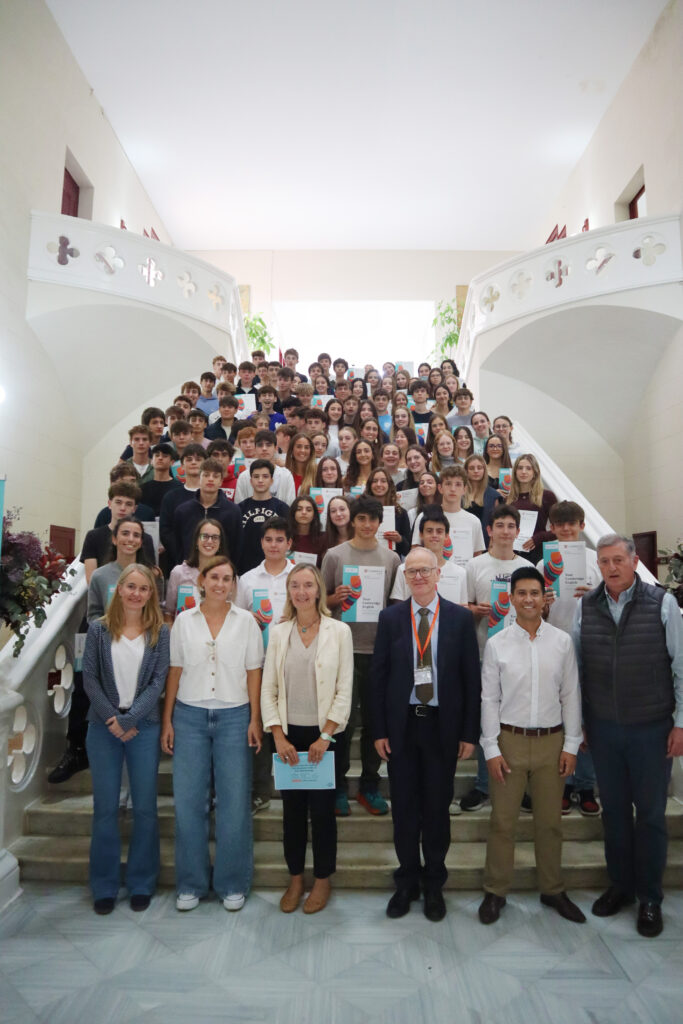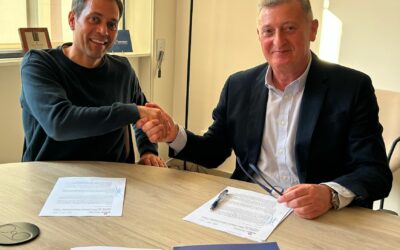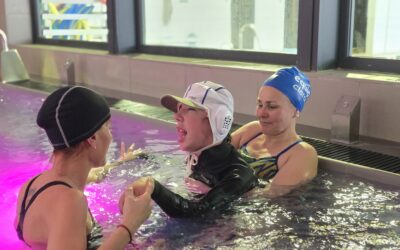– First of all, as an introductory paragraph, could you give us a brief presentation about who you are and the role you play professionally?
My training in Pedagogy and a Master’s degree in Business and Marketing Management have enabled me to become the Regional Director of Cambridge University Press & Assessment. Our mission and objective as a department of the University is to contribute to the improvement of our students’ level of English and to demonstrate this to the world.
– Could you tell us a bit about the Cambridge language program and its main goal?
In line with Cambridge’s mission, the programme aims to maximise student progress, taking into account that learning paces vary. In addition, the programme includes a series of multi-level tests and official Exams that allow us to identify areas to pay more attention to and continue to improve year after year.
– What are the main benefits students gain from participating in this program? How does it differ from other English programs?
I think the most tangible one is obtaining an official language qualification from the University of Cambridge that they can use in their adult life for their CV, mobility around the world, etc. However, I would like to highlight other tremendously valuable intangible benefits: having a goal to achieve is motivating in itself, but achieving it requires tenacity, perseverance and will. In general, people who obtain a Cambridge certificate have the necessary attitude to achieve the challenges they set themselves.
– What methodology is used in the classes, and how is it adapted to meet the needs of our students?
There is no perfect methodology, but we do combine the most appropriate ones depending on the learning objective and the maturity of the learner. We present relevant and interesting situations for the learner, the target language and many different opportunities for practice. The variety of content presentation media (songs, videos, stories, texts, topics), the variety of practice activities at different levels and the exquisite professionalism of the SCS teaching team allow us to adjust to the different needs of the learners.
– Could you share some examples of successes our students have achieved thanks to this program?
Obtain excellent grades in official exams, mentions at higher levels, a general improvement in reading comprehension, a much higher level of oral expression than usual and a greater motivation to learn English.
– How are teachers supported within the program to ensure high-quality teaching? Do they receive ongoing training?
The success of this programme would not be possible without the involvement and dedication of a truly dedicated teaching team. This team receives continuous training in didactics, improvement of specific areas according to Benchmarking results, linguistics and specific Cambridge Exams preparation. A staff willing to learn continuously is capable of transmitting a passion for learning and the excellent student results are directly related to the SCS teaching team.

– What is your opinion on having native-speaking teachers in the school?
There is no one better than a non-native teacher to understand the difficulties of a learner whose language is Romance or Latin-rooted. SCS teachers are trained not only linguistically, but also in language teaching, i.e. how to teach a language to a non-native learner. A common mistake when thinking about native teachers is to confuse pronunciation with accent. The English language has become a lingua franca and our students will need to understand the English spoken by a person from France, Canada, Brazil or any other country in the world. Different accents, yes, but at the end of the day, English.
– How does the program prepare students for the Cambridge exams, and what types of certifications can they obtain?
The preparation for the Exams is integrated into the routine of their school day. The objective is to learn the language and the certification is the proof of that achievement, the reward for your effort.
At SCS we carry out different types of tests: formative assessment tests which provide us with data and trends in skills development and which we use to design the teacher training plan for the following year. And the official Cambridge exams which provide official certificates of language proficiency. The celebration of this great achievement at the annual certificate award ceremony is a source of satisfaction for the whole educational community: families, students, teachers and the entire SCS institution.
– How do you think mastering English through this program can influence our students’ academic and professional futures? Are 21st-century skills specifically addressed through the Cambridge Life Competencies Framework, and how are they integrated into daily learning?
A few years ago, demonstrating proficiency in English was interesting, now it is indispensable. Many university degrees are now teaching subjects in English and some universities are teaching entire degrees in English. What about the labour market, the globalisation of economies and mobility in Europe. English is the world’s communication language.
As for 21st-century skills, they are also worked on and developed throughout the different school years. Creative thinking, communication, learning to learn, collaboration, critical thinking and social responsibility are fundamental skills for our students to be successful in their personal, professional and social spheres when they reach adulthood.
– How can families support their children in language learning and participation in the program?
At Cambridge we have identified three key areas of family involvement: learning a little very often, building their confidence and respecting their likes and interests.
It is better to practise a little on a regular basis than to make big one-time efforts. The key to learning English is continuous practice and exposure to the language. When they are very young, start with cartoons or children’s songs in English (without subtitles) accompanied by an adult, for a few minutes, but every day. They offer very controlled and appropriate language for the little ones and if they see that their mum or dad is with them they will feel safe and will normalise the introduction of English at home. As they get older, if this routine is consolidated in the family environment, we can introduce English subtitles and move on to series or films.
Building their confidence is fundamental to accept that it is OK to make mistakes when speaking English. The important thing is to learn and move on. Motivate them by applauding their progress, however small it may be, and celebrate effusively when they obtain their official certificate.
Finally, take into account their tastes and interests in relation to the film we are going to watch together in English, the cartoons or the activity we want to do with them.
– You’ve worked with many schools—what stands out to you about Sagrat Cor Sarrià?
The absolute dedication of the entire SCS team to achieve the maximum potential of each and every one of the students in an environment that exudes respect, vocation, generosity and undeniable professionalism.
– What advice would you give to new students considering joining the program?
Make the most of the opportunity that SCS gives you and trust the teacher who asks you to make a little more effort. If he/she does so, it is because he/she cares about you and knows that you have potential and wants you to develop it to the maximum.
– Finally, what message would you like to send to families about the value of this program for their children?
The alliance between SCS and Cambridge guarantees the highest quality, rigour and excellence in the teaching-learning process and the certification of English levels. The teaching staff is continuously trained to achieve the best results and Cambridge works together with the whole SCS team to keep improving year after year.




